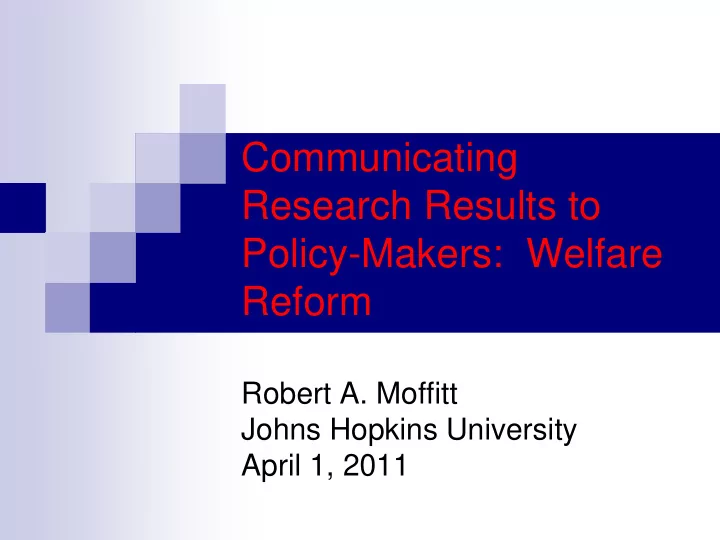

Communicating Research Results to Policy-Makers: Welfare Reform Robert A. Moffitt Johns Hopkins University April 1, 2011
Communicating Effectively with Policy Makers Not everyone wants to do it, but nice if you can Does take some work and some effort, however Sometimes your research relates to an existing issue being discussed and you want to add your contribution Sometimes your topic is not of high public interest, but you would like to try to generate some interest
Example: Welfare Reform Policy I will illustrate some principles by using the example of welfare reform policy, which was extremely active approximately 1994-2000 Congress passed legislation in Summer 1996, but discussion had begun before and was intense for a few years thereafter The bill introduced work requirements, time limits, block grant to welfare (AFDC) Issue: effects on poverty, labor force, family structure and marriage/childbearing
Types of Activities This was an issue that was obviously already on the table; I had done research on it Most activity was in Washington: Administration and Congress were the two groups to whom researchers addressed themselves I participated in both, chaired an NRC panel, led a survey, etc.
General Landscape in the Welfare Reform Debate In this case, there were a large number of active intermediary organizations (Brookings, Urban, et al.) who organized events to which policy-makers were invited or featured, along with researchers But there was also direct communication with people in the Administration and on the Hill
My role (typical researcher role): Generally, to be an expert on the research Summarize the research Answer questions Suggest further methods of evaluation or examination of the question Comment on what research says about effects of existing or proposed legislation or Amendments
Types of things I did: Wrote policy briefs, tried to get attention to them Attended conferences, pushed my research and my research summaries Communicated with people in the Administration (HHS) Communicated with people on the Hill, although always as part of a group
Five Principles Simplify, translate, communicate to non- 1. researchers Minimize caveats 2. In materials, use colors, visuals, glossies, 3. bullet points Keep it short and to the point 4. Stress the importance of your research 5. findings but avoid direct advocacy for a position; be a neutral researcher
1. Simplify, Translate, Communicate Most research is obviously too technical for policy-makers Practice writing for non-technical audiences Make points without jargon, buzzwords; straightforward sentences and words Put yourself in their heads and try to figure out how they would understand it
2. Minimize Caveats and Qualifications One of the hardest things for researchers to do; we view each piece of research as only one piece of evidence But qualifications will make your listener think you aren’t sure and he shouldn’t put much weight on your findings Try to hit the happy medium: be firm in your statements but don’t overstate Use “mild” qualifying language
3. Materials In preparing materials, make them eye-catching Welfare reform briefs and slide presentations: I did several, glossy, etc. Had to figure out how to have only 1 graph to illustrate the key point Decide on your one or two key points: bullet and emphasize those; keep others very much in the background
4. Short and To the Point Not our natural style…. But essential My policy briefs: 1 or 2 pages When a longer document was called for, a short Executive Summary in non-technical terms was absolutely necessary Focus in on the points the listener is going to be most interested in
5. Neutral Researcher In the welfare reform debate example, the discussion was highly politicized For my credibility, it was important that I try to be viewed as a reasonably neutral researcher reporting objectively on results Of course, often your results will point in a particular direction and you may want to say that But I strenuously avoided directly revealing my own personal opinions on highly partisan matters
Some Final Remarks I learned a lot; you should jump in and acquire a little experience; you will get better at it later Did I and other researchers have an impact? Yes, I think so….(Blank,2010) Can I point to a single line of legislation and say “that is there because of research”? No. At minimum, you just want to have the facts be fairly considered in the public discussion
Recommend
More recommend